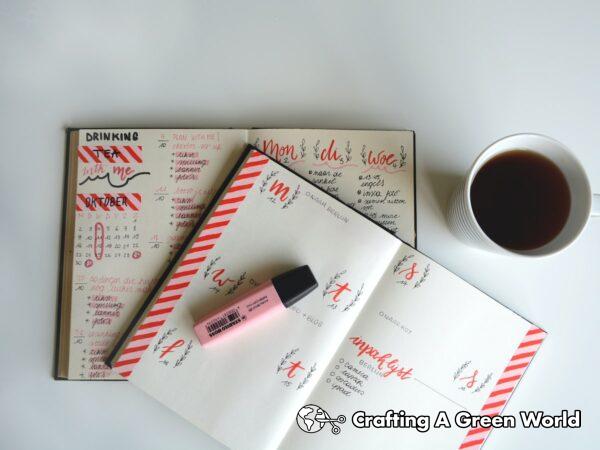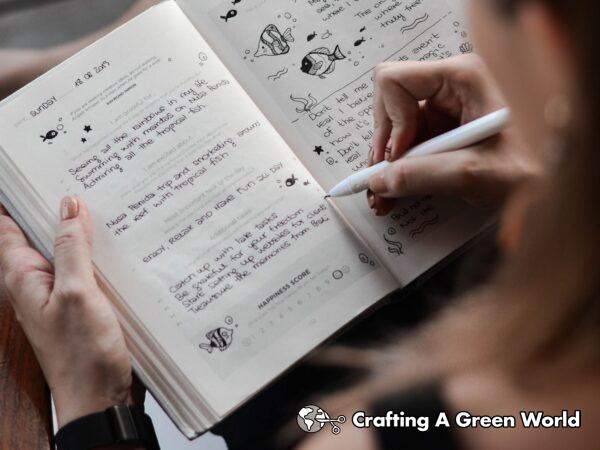Embarking on a journey of personal healing and recovery can be an enriching, yet challenging experience. Journaling can play a pivotal role in this process, providing an outlet for your thoughts, feelings, and ideas during the recovery period.
In this article, we are excited to share with you a plethora of recovery journal prompts that can serve as a stepping stone on your path towards healing. Whether you’re using journaling as a tool to navigate through personal growth, find strength, or simply as a therapeutic technique, our collection of prompts is designed to assist you.
So, arm yourself with your favorite journal, find a serene space, and let’s launch into a realm of self-awareness, expressiveness, and holistic recovery together. 🤗
Exploring Sobriety
Exploring Sobriety through journaling prompts helps us to understand our feelings, triggers, and progress in the sobriety journey, fostering resilience and self-awareness. Here are 20 writing prompts that can assist you in your sobriety exploration:
- Reflect on the reasons that motivated you to start your sobriety journey.
- Write about a time when you successfully resisted temptation during your sobriety journey. What helped you in that moment?
- Describe a moment when you felt particularly proud or accomplished since you started on your path to sobriety.
- List three positive changes you have experienced since becoming sober.
- Write a letter to your past self, explaining how your life has improved since you became sober.
- Think about a difficult situation or strong emotion that challenged your sobriety. How did you navigate through it?
- Visualize and detail your life in five years, assuming that you maintain your current path of sobriety.
- Identify three ways you can celebrate your successes in sobriety without turning to substances.
- Imagine a possible trigger situation. Write down ways you could handle it while maintaining your sobriety.
- Look back on your life before sobriety. What significant changes in your perspective can you identify since then?
- Detail some personal strengths that have emerged or become more noticeable since you started your sobriety journey.
- Write about something positive that you have reclaimed or discovered in your life because of your decision to get sober.
- Detail an experience where you received support in your sobriety journey. How did it make you feel?
- Identify an aspect of sobriety that you find challenging. How could you address this challenge?
- Write a thank-you note to yourself, acknowledging the work you have put into maintaining your sobriety.
- Reflect on any fears or anxieties you may have about staying sober. How can you confront and overcome these fears?
- Describe a moment when you experienced true joy since committing to sobriety.
- Explore how your relationships have changed since you began your sobriety journey.
- Write about a future goal that your sobriety is helping you to attain.
- Dedicate a journal entry to acknowledging your growth and resilience throughout your sobriety journey.
Facing Past Challenges
Facing Past Challenges serves as an important part of recovery, aiding in understanding and acceptance of previous struggles, so as to nurture personal growth and resilience. Here are 20 thoughtful prompts that delve into reflecting on past difficulties:
- Write about a challenge you faced and overcame. What lessons did you learn from it?
- Can you think of a time when you made a mistake? How did you make amends?
- What was your hardest personal struggle to date? How did it shape you as a person?
- Describe a situation you wish you had handled differently. What would you change if given a second chance?
- Reflect on the struggle that made you understand your own strength. How did it change your perspective towards challenges?
- Can you think of an instance when you didn't have control over the situation? How did you cope with it?
- Write about an old wound that’s still in healing. What steps are you taking towards recovering from it?
- Describe a time when you let go of something or someone important. How did it affect your life?
- What's the biggest risk you've ever taken? Would you do it again?
- Reflect on a time when you stepped out of your comfort zone. What motivated you to do so?
- Have you ever failed at something you were passionate about? What did you learn from the experience?
- Write about a past experience that you would categorize as a ‘life-altering moment’. How did it transform your thoughts or behavior?
- Have you ever faced a moral dilemma? How did you resolve it?
- Did you ever face a problem that you thought was too big to overcome? How did you deal with it?
- Write about a time when you had to confront a fear. How did it impact your life?
- Reflect on a time when you had to make a difficult decision. What factors influenced your choice?
- Can you think of a time when your emotional strength was tested? How did you pull through?
- Has there been a situation that drastically changed your plans or path? How did you deal with the change?
- Can you recall a setback that led to a significant personal growth? What changes did you observe in yourself?
- Write about an event in your past that made you more resilient. How did this resilience help you in another situation later on?
Manifesting Future Goals
Manifesting Future Goals through journaling in a recovery context involves visualizing and articulating desired outcomes, fostering a focused mindset conducive to personal growth and transformation. Here are twenty journaling prompts aimed at kicking off this thought-provoking process:
- Write in detail about your primary goal for life once recovery is complete.
- Jot down the top three changes you'd like to see in yourself after recovery.
- If you met your future, recovered self, what would you hope he/she has accomplished?
- Write a letter to your current self from the perspective of your future self.
- How can you best support yourself to reach your future goals?
- Identify three habits you would like to develop and explain how they relate to your overall goals.
- Create a 'future self' portrait, through detailed writing, of your desired state post-recovery.
- List five skills or personal qualities you'd like to develop or improve during recovery.
- Write about a dream holiday location you plan to visit after your full recovery.
- Imagine it's five years from now, and your recovery journey is widely celebrated. What's the narrative being told?
- Detail the steps you need to take to align with the future goals you've set for yourself.
- Write about the motivation and person you want to become following recovery.
- List three things you hope people say about the transformed you.
- What accomplishments are you most looking forward to?
- Compose a motivational pep talk for days when your commitment wavers.
- Imagine you've achieved your goal. What advice would this successful version of you have for your present self?
- Write about the positive impact you want to have on others after full recovery.
- Design a mantra or motto that embodies your future self to inspire you during your recovery journey.
- Document a typical day in your life once you've fully recovered. Go into as much detail as possible.
- Write a letter of gratitude to your future, recovered self for the hard work and dedication it took to get there.
Self-reflection On Recovery
Reflecting on your recovery journey in a journal can facilitate self-growth, understanding, and resilience in overcoming challenges. Here are 20 thought-provoking prompts intended to stimulate self-reflection on recovery:
- Write about a moment in your recovery process that you are particularly proud of. What made it significant?
- Recall a difficult period during your recovery. How did you overcome it?
- Record an instance where you noticed significant progress in your recovery. How did you feel?
- Detail any setbacks you've experienced. How have these setbacks affected your recovery perspective?
- Describe a day when you were very satisfied with your recovery progress. What went well?
- Think of a time when you doubted your recovery. How did you regain your faith?
- Chart your emotional journey throughout your recovery. How has it changed?
- Identify any negative patterns that have recurred in your recovery journey. What steps have you taken to overcome them?
- Consider any changes to your self-image since beginning recovery. How has it evolved?
- Reflect on the role of support systems in your recovery. How have they influenced your journey?
- Write about a life lesson recovery has taught you.
- Describe a situation during recovery that put your strengths to the test. How did you cope?
- Discuss an instance where you felt gratitude during your recovery.
- Contemplate any forgiveness, either of others or self-forgiveness, that has come from your recovery experience.
- Identify an aspect of your recovery that you find most challenging. Why?
- Reflect on any new habits or routines implemented since your recovery began.
- Write about any surprises, good or bad, you faced on your recovery journey.
- Think about a conversation which had a significant impact on your recovery. Why was it impactful?
- Describe a decision you made during your recovery that you now regret. What would you do differently?
- Consider the most rewarding aspect of your recovery journey. What makes it so rewarding?
Witnessing Personal Growth
Witnessing personal growth through recovery journaling enables us to be aware of our progress, changes within us, and improvements in our coping mechanisms. Here are 20 prompts designed to help you explore personal growth in your recovery journal entries:
- Reflect on how you have evolved in the past year. What are some major changes you've observed?
- Write about a new skill or positive habit you developed during your recovery.
- Discuss a challenge you overcame during recovery and how it made you feel.
- Recount a time when you recognized your own personal growth and how it made you feel.
- Create a before-and-after description of a version of yourself before recovery and where you are now.
- Consider a time when your reaction to a situation was different due to your growth.
- List three achievements you're proud of that were a direct result of your recovery.
- Write about a situation where you used new coping mechanisms.
- Describe an instance when you stood up for yourself during your recovery.
- Marinate on how your relationships have changed or improved since recovery.
- Chronicle a time you felt in control of a situation that would have previously overwhelmed you.
- Describe a moment when you recognized the progress and improvements you’ve made.
- Reflection on a piece of advice you would tell your past self, based on your current growth.
- Write about how your self-esteem has improved since you started recovery journey.
- Discuss a time when you put a new skill or knowledge to use, and the outcome.
- How have your goals or aspirations changed during your recovery process?
- Reflect on a particular moment of despair, how were you able to overcome it?
- Describe how you’re becoming the person you always wanted to be.
- Write about how you've grown in your understanding of yourself.
- Highlight the value of personal growth that your recovery journey has taught you.
Finding Peace In Healing
Finding Peace in Healing through journaling allows us to explore our emotional landscape, process traumas, and actively participate in our mental and emotional well-being. These 20 prompts can help guide you on your journey towards peace and healing:
- Reflect on a moment of peace you've recently experienced. What did it feel like?
- Write about an experience that caused you pain or distress. How can you find peace in letting it go?
- Identify something about yourself you want to heal. What steps can you take towards healing?
- Write a forgiveness letter to someone who hurt you.
- Journal about a time you practiced self-care. How did it contribute to your healing?
- Describe an activity that brings you peace of mind. Can you incorporate this more into your daily life?
- Express your thoughts about the saying, "Time heals all wounds." Do you find it accurate?
- Document your feelings when you encounter a trigger for past trauma. What are some coping mechanisms?
- List five gratitudes for today. How could they alleviate your distress?
- Envision a peaceful place. Paint a picture in words; revisit it when anxious.
- Write about an accomplishment you're proud of. How did it contribute to your personal growth?
- Write a thank you letter to your body for its resilience.
- Identify an issue you're beating yourself up over. How can you offer yourself grace?
- Describe a dream where you felt utterly peaceful. Can it be a part of your reality?
- Write about the person you'd like to be post-healing. What attributes and strengths does this person possess?
- Identify a negative thought pattern you’d like to shift. How can this shift bring peace into your life?
- Paint a picture of a peaceful day. From morning till night, what does it involve?
- Identify a personal belief that stands in the way of your healing. Can you reframe it?
- Write a letter of advice to your future self on maintaining peace.
- Reflect on your healing journey so far. How has it transformed you?
Building Resilience Through Recovery
Developing your resilience through the lens of recovery allows for emotional growth and personal strength, nurturing your ability to withstand and overcome adversity. Here are 20 journal prompts to cultivate resilience in your journey of recovery:
- Detail a past event where you successfully overcame adversity. How did it change you?
- Document any current challenges you're facing and outline potential solutions.
- Write about a time when you made a mistake. How did you grow from this situation?
- Identify five strengths and how they might help you in your recovery process.
- Envision your life post-recovery. What have you gained from the experience of overcoming your challenges?
- Describe an occasion when you fell just short of achieving a goal. What lessons did you learn from this?
- Reflect on a situation where you demonstrated resilience. What led to your resilient response?
- Jot down three ways you can enhance your resilience during challenging times.
- Consider a role model of resilience in your life. What qualities do you admire in them?
- Express gratitude for the situations and people that have helped you strengthen your resolve.
- Write about a transformative adversity you've experienced. How has it shaped your view of hardship?
- Create a commitment to yourself on how you will handle future roadblocks.
- Record how you cope with stress and any ways you want to improve your coping techniques.
- Think about a situation where you felt like giving up but didn’t. How did you muster the strength to continue?
- Identify a challenge you’re currently facing. Write three positive outcomes that could emerge from it.
- Express appreciation for your journey and how it has contributed to building your resilience.
- Write a letter to your future self highlighting your resilience and the ways you overcame adversities.
- Reflect upon a phrase or quote about resilience that resonates with you.
- Discuss how you handle criticism or conflict and how it can strengthen or diminish your resilience.
- Contemplate about the growth you've experienced thus far in your recovery journey. What has surprised you about yourself?
Coping Skills And Techniques
Coping skills and techniques become an invaluable toolset during recovery, aiding in stress management, reducing harmful behaviors, and strengthening emotional resilience. Here are 20 journal prompts that can facilitate the development and enhancement of your coping skills:
- Write about a recent stressor you faced. How did you handle it?
- Describe a time when your usual coping strategies didn't work. What could you have done differently?
- Reflect on a challenging situation. How would you apply newly learned coping skills to it?
- Write about a coping technique you find most effective and why.
- List five things you could do to distract yourself when facing a craving or urge.
- Describe a situation when you felt vulnerable. What steps could you take to self-soothe during similar experiences?
- Write down three things you can do to foster a positive mindset.
- Reflect on a time when you felt overwhelmed with emotions. How could deep breathing or mindful exercise help in those moments?
- Identify three situations that often trigger stress for you. Write a plan for dealing with each.
- Jot down a dialogue you could have with yourself when you’re feeling low.
- Recount a time when you used a coping strategy successfully.
- Note down three ways you can maintain your composure in a tense situation.
- Suggest a way to use creative expression, like writing or drawing, as a coping method during challenging times.
- Reflect on a dream or goal that helps you stay focused during recovery.
- Write about an example of how physical activity helps manage your stress.
- Describe a technique that helps you stay present and avoid focusing on past mistakes or future anxieties.
- Think about a coping skill you'd like to develop. Write a plan for how to cultivate it.
- Reflect on a time when you didn't resort to old, unhealthy behaviors in response to stress. Celebrate this victory.
- Jot down three affirmations that help you stay resilient during hard times.
- Write a letter to your future self, detailing your strengths and the coping skills that you've mastered.
Navigating Relationships In Recovery
Managing relationships during recovery can be a complex and emotionally charged process, providing many insightful themes to explore in your recovery journal. Here are 20 prompts focusing on navigating relationships in recovery:
-
Describe a relationship that has been impacted by your recovery. In what ways has it changed?
-
Explore how your relationships have influenced your recovery journey.
-
Reflect on a conversation you've had about your recovery. How did it make you feel?
-
Jot down three ways you can set boundaries in your relationships to support your recovery.
-
Write a letter to a loved one expressing your gratitude for their support on your recovery journey.
-
Describe a moment when you felt misunderstood by a loved one during your recovery process. How would you like them to understand you?
-
What fears do you have about your relationships changing due to your recovery? Write about them.
-
Create a list of qualities you appreciate in a supportive friend or family member. Why are these important to you?
-
Reflect on a relationship that may be hindering your recovery. How can you address this?
-
Write about a loved one who may not understand your recovery journey. What would you like them to know?
-
Consider a conflict you've encountered during your recovery. How did you handle it and what could you do differently next time?
-
Imagine a future where your relationships are supportive and fulfilling. What does that look like?
-
Explore the connections between your self-esteem and how you relate to others.
-
Write about how you would like your loved ones to support you during challenging moments in your recovery.
-
Reflect on a healing or positive interaction you've had recently; how did it affect your recovery process?
-
List actions you can take to better communicate your needs to the people in your life.
-
Describe how recovery has positively influenced your relationships.
-
Write a letter to yourself about the importance of maintaining healthy relationships in your recovery journey.
-
Meditate on an instance where you felt supported by a friend or family member. How did that make you feel?
-
Consider how your recovery process has changed your perspective on relationships.
Understanding And Managing Triggers
Understanding and managing triggers in recovery is crucial for reducing the occurrence of relapses and maintaining progress, and journaling can provide a helpful tool for these processes. Here are 20 journal prompts designed to help you identify, understand, and manage your triggers effectively:
- Write about a time when a trigger led to a setback in your recovery. What was the trigger, and how did it affect you?
- Identify three current triggers in your life. How do they influence your thoughts and behaviors?
- Reflect on a trigger you have successfully managed. How did it make this possible?
- Write a letter to a trigger, describing it does to you and how it makes you feel.
- Visualize a trigger-free day. What would it look like?
- Think about a trigger you’d like to overcome. What steps can you take to achieve this?
- Describe a comforting memory or mantra you could use to counteract a trigger.
- Write about a common situation that triggers you and come up with three different strategies for handling it.
- Reflect on how understanding your triggers has helped your recovery.
- Visualize successfully managing a trigger. What mental and physical changes can you notice?
- Think about the feelings you experience immediately after being exposed to a trigger. How could you self-sooth during these moments?
- Write a conversation between you and your future self who has successfully managed triggers.
- Think about supportive people in your life. Write a letter asking them for help when you face a trigger.
- List any physical sensations you might feel when a trigger arises. How can you respond effectively to these sensations?
- Reflect on a trigger that’s linked to a person you know. How can you approach this situation?
- Write about an unexpected trigger you’ve encountered. How did you react?
- Imagine a moment when you recognize a potential trigger before it takes full effect. How do you navigate away from it?
- Write an empowering affirmation to repeat during moments when a trigger is present.
- Think about how triggers have evolved throughout your recovery. How have they changed and why?
- Reflect on how your understanding of your triggers has changed over the course of your recovery.
Exploring Gratitude In Recovery
Exploring Gratitude in Recovery through journaling can inspire a deep sense of appreciation for sobriety and accountability, and encourages the practice of acknowledging progress and small wins. Here are 20 prompts to guide your gratitude exploration throughout your recovery journey:
- Write down three things you're thankful for about your recovery journey so far.
- How has your perspective on life changed since starting your recovery process?
- Reflect on a moment of strength within your recovery journey. Why are you grateful for this moment?
- Identify three ways recovery has positively impacted your relationships.
- What strengths, skills or abilities has your recovery allowed you to discover about yourself?
- Write a thank you note to your future sober self.
- How does feeling gratitude contribute to your healing process?
- Describe an unexpected benefit of your recovery journey.
- What treatments or resources are you thankful for that aid in your recovery?
- Write about a hard lesson you learned from your past which you're now grateful for.
- What aspect of your new, sober life fills you with the most gratitude?
- Identify one challenge from the last week and why you're grateful for it.
- How has practicing gratitude during recovery benefited your overall well-being?
- Describe an experience where you found joy in a simple, mundane routine.
- What is a mistake you made during recovery that you're now grateful for?
- Who are the people you're most grateful for in your support system?
- Write down one thing recovery has been teaching you about the value of patience.
- Reflect on a moment where you successfully resisted temptation. How does it make you feel?
- Describe one healthy habit you've adopted recently and why you're grateful for it.
- Write a letter to someone you're thankful for, acknowledging their help during your recovery.
Addressing Regrets And Making Amends
Addressing regrets and making amends in recovery journaling is a powerful step toward healing and growth, as it cultivates self-forgiveness, helps repair relationships, and fosters resilience. Here are 20 specific prompts to assist you in this significant process:
- Detail a regret that you often think about. How has it affected your life?
- Write a heartfelt apology to yourself for any self-hurtful actions done in the past.
- Imagine that you could go back to a specific moment of regret. What would you do differently?
- Think of a person you've wronged. Draft an apology letter to them.
- Acknowledge a mistake you've made. How can you turn this regret into a lesson?
- Reflect on a time when you struggled with guilt. How can you forgive yourself?
- Write about a time when you made amends to someone. How did it impact both parties?
- Detail three things you could do to make amends to yourself.
- Describe a scenario where you accepted an apology. What emotions did you experience?
- List ways you can avoid repeating a past regretful action.
- Explore a regret that you're ready to let go of. How will you move forward?
- Create a dialogue with your past self. Offer understanding and forgiveness.
- Think about someone you wish to make amends with but can't. Write them a reconciliation letter.
- Chart out a plan to make amends for a past mistake.
- Reflect on the obstacles that are preventing you from addressing a regret or making amends.
- Write a forgiveness letter to someone who might have hurt you in the past.
- Write about the feelings you associate with a significant regret. How can you transform these feelings?
- Identify what stops you from making amends. How can you overcome this?
- Assess the impact of a past regret on your present life.
- Explore how making amends could change your future for the better.
Forgiving Yourself And Others
The act of forgiving yourself and others paves the path to recovery, and jotting down thoughts related to it can solidify steps towards healing. Here are 20 writing prompts to help navigate through this journey of forgiveness:
- Describe a mistake you've made that you need to forgive yourself for.
- Write a forgiveness letter to yourself for that mistake you made.
- Reflect on a time when you managed to forgive yourself. What led to that moment?
- List three reasons why you deserve forgiveness.
- Consider a situation where forgiving yourself would bring peace. What steps can you take to achieve it?
- Think about someone you need to forgive. Describe why forgiveness is important in this case.
- Write a forgiveness letter to a person who has wronged you.
- Reflect on a moment when you offered forgiveness to someone. What prompted this action?
- List down three positive outcomes of forgiving others.
- Think about a situation where you struggled to forgive someone else. What makes it difficult?
- Describe feelings that emerge when you think of forgiving someone who wronged you.
- Consider someone who never apologized for their actions. Write about how you can find forgiveness despite their refusal to apologize.
- Reflect on a time when someone forgave you. How did it change the relationship between you two?
- List down three important lessons you've learned about forgiveness.
- Imagine a world where forgiveness doesn’t exist. What implications would it have on personal relationships?
- Write an open letter to forgiveness, expressing your gratitude for its ability to heal wounds.
- Think about a time your forgiveness helped someone else heal. Describe how it made you feel.
- Consider forgiveness as a journey, not a destination. Write about the steps you are taking on your path.
- Imagine the best possible outcome from forgiving someone important in your life. What does that look like?
- List three personal mantras that will help you remember the power of forgiveness in challenging times.
Dealing With Relapse
Dealing with relapse is an important part of recovery, and journal writing can offer a practical and therapeutic way to process thoughts, feelings, and actions associated with it. Here are 20 thought-provoking journal prompts to help navigate through a relapse:
- Write about your feelings immediately after the relapse. How did they impact your state of mind?
- Reflect on the circumstances that led to the relapse. How can you avoid these triggers in the future?
- List your main reasons for wanting to maintain sobriety or recovery.
- Identify three lessons learned from this relapse.
- Describe your plan of action for dealing with the immediate aftermath of a relapse.
- Envision your life free from addiction. Explain in detail what it looks like.
- Write a compassionate letter to yourself, assuring that one relapse doesn't define you or your recovery.
- Describe what support looks like to you during this trying time.
- Identify your main pillars of strength. How can they help you navigate through relapse?
- Detail the steps you will take to rebuild trust with loved ones following a relapse.
- Write about managing guilt and shame after a relapse.
- Identify coping strategies that can help you during the immediate post-relapse phase.
- Reflect on the importance of forgiveness in the process of dealing with a relapse.
- Write an encouraging letter to your future self.
- List the qualities you have that will help you bounce back from this relapse.
- Reflect on the fears associated with your relapse.
- Write a gratitude list post-relapse. Even in hard times, what are some blessings you can acknowledge?
- Reflect on how overcoming this relapse would make you stronger in your recovery journey.
- Define "hope" in your own words. How can this hope guide you through the process of dealing with a relapse?
- Reflect on any external support or tools you feel would benefit your recovery process after a relapse.
Embracing New Healthy Habits
Embracing new healthy habits in recovery journaling can strengthen your resilience, improve your mental health and guide you towards a balanced lifestyle. Here are 20 prompts that can assist you in exploring and incorporating new healthy habits:
- List five new healthy habits you want to incorporate into your life.
- Describe why you chose these new habits and how they will contribute to your recovery journey.
- What are some obstacles you foresee encountering while trying to form these new habits?
- Write about a time you overcame a challenge in forming a new habit.
- Describe your strategy for implementing one of your new habits tomorrow.
- Reflect on the end goal of adopting this new habit – how do you imagine it will impact your life positively?
- Write a letter to your future self about how implementing this new habit has made a difference.
- What are some strategies to keep motivated when progress seems slow?
- Explore any fears you may have about committing to new habits.
- Discuss how you can make these new habits part of your daily routine.
- Reflect on the support you need from those around you to help form these new habits.
- How will you celebrate small victories in your path to embracing new habits?
- Write about a habit you once thought you couldn't conquer but now have.
- Explore the significance of patience and consistency in shaping these new habits.
- Write down reminders or affirmations that will keep you on track.
- Describe a situation where you successfully resisted a bad habit by replacing it with a healthy one.
- How does forming new habits align with your broader goals for recovery?
- List the benefits you’ve already experienced from embracing new health habits.
- Describe how you can learn from slips or setbacks in your journey to forming new healthy habits.
- Write a gratitude note for your commitment to embrace new healthy habits for recovery.
Emotional Processing In Recovery
Emotional processing in recovery through journaling prompts helps us to understand, express, and manage our emotional experiences during the journey of recovery. Here are 20 prompts designed to assist with emotional processing during this transformative period:
- Write about a time when you were overwhelmed by your emotions. What could you have done differently?
- Describe an emotion you've been feeling lately but struggle to express.
- List three emotions that you often experience whenever you think about your recovery process.
- Write a letter to yourself on a day when you are feeling exceptionally challenged.
- Imagine your emotion is a physical entity. What would it look like, and what would you say to it?
- Write about an emotion you've avoided dealing with during your recovery process.
- Reflect on a recent moment when you successfully managed a difficult emotion.
- Explore how your relationships have been affected by the emotions you've experienced throughout your recovery.
- What is one emotion you'd like to experience more of in your recovery journey?
- Describe a situation from the past week where your emotions surprised you.
- Draw or describe a 'mood map' of your typical week.
- Write about an instance where you felt a range of conflicting emotions simultaneously.
- Identify an emotion that has been helpful in your recovery and explain why.
- Describe a fear you've faced since starting recovery and how it made you feel.
- Write a letter of forgiveness to an emotion that has caused you distress during your recovery.
- Write about how your emotional perspective has evolved or changed since starting your recovery.
- List three healthy coping mechanisms you've developed to manage distressing emotions in recovery.
- Reflect on a situation where you effectively communicated an emotion you felt.
- Write down a goal related to emotional processing that you want to reach in the next 30 days.
- Identify the most dominant emotion on your recovery journey this week and write about how you plan to address it.
Handling Stress In Sobriety
Handling Stress in Sobriety through journaling can empower individuals to manage their stress levels, develop coping strategies, and stay committed to their sobriety journey. Here are 20 writing prompts to help you navigate stress while maintaining your sobriety:
- Describe a stressful situation you've encountered and your response to it.
- Jot down three coping mechanisms you can use when faced with stress.
- Write a letter to stress, expressing your feelings and resolve to handle it.
- Identify a recurring stressful situation in your sobriety journey and brainstorm ways to manage it.
- Recall a time you overcame stress without resorting to substance abuse. How did you do it?
- List five ways you can incorporate relaxation methods into your daily routine.
- Reflect on how your stress level affects your decision-making abilities.
- Write about your most significant sources of stress and how you can minimize their impact.
- Draw a chart to monitor your stress level and note triggers.
- Write a scenario where you successfully navigate a stressful situation.
- Discuss the positive changes you've experienced since you started handling stress without using substances.
- Record a mantra or affirmation that inspires you to manage stress soberly.
- Describe your ideal stress-free day.
- Talk about how better stress management can aid your sobriety journey.
- Acknowledge three things your stress is trying to tell you and how you will respond.
16.Write about any stress-related fears you have concerning sobriety, and how you plan to overcome them.
17. Jot down a list of hobbies or activities that can help reduce stress.
18. Reflect on the lessons you've learned from coping with stress in your sobriety journey.
19. Create a step-by-step action plan for handling a high-stress situation.
20. Finish the sentence: "Today, I will manage my stress by…"
Embracing Joy In Recovery
Embracing Joy in Recovery through journal prompts is a powerful way to foster positive emotions and cultivate happiness during the healing process. Here are 20 journal prompts to help you embrace joy in your recovery journey:
- Write about a moment in your recovery that made you feel proud.
- Describe a joyful memory from before you started your recovery journey.
- Jot down three things in your life currently that make you smile.
- Create a list of five small things that brought you joy today and why.
- Recall a time during your recovery when you felt deep gratitude.
- Describe a moment during your recovery when you were laughing out loud.
- Write about someone in your life that brings you joy. What do they do that makes you happy?
- Reflect on how your life has positively changed since you began the recovery.
- Write a letter to your future self expressing the joy and happiness you imagine.
- Describe a place where you feel joy. What is special about it?
- Jot down your favorite uplifting quotes or sayings and describe why they inspire joy in you.
- Describe how you felt the last time you accomplished a goal related to your recovery.
- Write about a time when you were kind to yourself during recovery. How did it make you feel?
- Create a 'joyful' playlist – list songs that uplift you and write about why they inspire joy.
- Jot down three joyful things you aspire to do once you are fully recovered.
- Write about a moment when you felt a sense of peace in your recovery.
- Reflect on a time when you let go of something negative to embrace joy in your recovery process.
- Describe your favorite simple pleasure that helps nurture joy in your daily routine.
- Reflect on an unexpected joy that came from your recovery journey.
- Write about the ways you plan to keep joy alive in your life post-recovery.
Discovering New Interests And Passions
Delving into new interests and passions through recovery journal prompts can open doors to self-discovery and personal growth, making the recovery process engaging and therapeutic. Here are 20 writing prompts that can help uncover these fresh interests and passions:
- List three hobbies or activities you've always wanted to try but haven't yet. Why are you attracted to these?
- Describe in detail your ideal day. What activities does it include?
- Reflect on a time when you tried something new and it brought you joy.
- Write about a hobby that you used to enjoy. Why did you stop?
- Think of a book, movie, or artwork that deeply moved you. What did it spark in you?
- Consider a role model or someone you admire. What activities or interests of theirs would you like to learn more about or adopt?
- Describe an environment or setting where you feel most at peace.
- List three skills you would like to master and why.
- Write about how you would spend your time if money and commitment were not an issue.
- Consider an interest or activity that scares you but appeals to you. Why does it attract you?
- List five things that make you lose track of time.
- Write about a time when you were so engrossed in an activity that you forgot all your worries.
- Think about a project or goal you are passionate about. What steps could you take to make it a reality?
- Describe an adventure or journey you would like to embark on.
- Consider a career or job you have always dreamed of. What is it about this occupation that appeals to you?
- Write about a cause that deeply matters to you. Why does it have such a significant effect on you?
- Reflect on times when you were happiest. What were you doing? Who were you with?
- List five traits or skills you admire in others and would like to develop in yourself.
- Describe something you've experienced lately that made you curious or fascinated.
- Write about a dream or goal you have shelved or forgotten. How could you pursue it now?
Nurturing Self-love And Self-care
Nurturing self-love and self-care through recovery journal prompts allows us to build a healthier relationship with ourselves by acknowledging, appreciating, and taking care of our needs and desires. Here are 20 prompts that aim to enhance your practice of self-love and self-care:
- Record three qualities you love about yourself and explain why.
- Imagine your ideal self-care day. What are you doing and how does it feel?
- Write a letter of gratitude to your body for all it allows you to do.
- Identify and challenge a negative self-belief you hold. What is its positive counter-part?
- Detail the steps you're taking to care for your mental health.
- Create a list of five affirmations that boost your self-esteem.
- Think about someone who loves you. What would they say about you?
- Develop an action plan for when you're feeling low – what will you do to uplift your spirits?
- Discuss a negative habit you’d like to change and brainstorm ways to transform it into a positive one.
- Write out the various ways you express self-love and the happiness they bring.
- List five things that bring you satisfaction and pleasure.
- Identify three self-care activities you want to engage in this week and explain why you chose them.
- Draft a kind and supportive letter to yourself for when you're experiencing a challenging moment.
- Reflect on a time when you showed yourself love and care. How did it make you feel?
- Draw a self-love roadmap for the next six months. What milestones do you want to achieve?
- Write about an accomplishment that you’re really proud of.
- Record a list of your talents and gifts.
- Create a list of kind words you need to tell yourself more often.
- Reflect on a situation where you wish you had shown more self-love and care. How could you have treated yourself better?
- Make a commitment to yourself about one way you’re going to practice better self-care this week.
Evolving Identity In Recovery
Exploring your evolving identity in recovery through journaling can guide your journey of self-discovery and aid in maintaining progress. Below are 20 prompts to help you delve into the transformation of your identity throughout the recovery process:
- Jot down three qualities of your pre-recovery self that you'd like to strengthen post-recovery.
- Reflect on what recovery means to you in terms of personal values.
- Write about a milestone in your recovery that signified growth or change.
- Describe what aspects of your past self do you no longer identify with.
- Document the changes you've noticed in your relationships since starting recovery.
- List three new developments in your post-recovery identity that you find empowering.
- Detail an instance where your post-recovery self made a decision your pre-recovery self wouldn't have.
- Reflect on a moment you felt entirely at peace with your evolved identity.
- Write about a situation where your changed identity surprised you, positively or negatively.
- Contemplate any uncertainties or fears you have about your changed identity and how you can address them.
- Explore the role of self-care in shaping your recovered identity.
- List five words that best describe who you are now in your recovery process.
- Describe an event where your new identity felt particularly evident.
- Reflect on a challenge that your post-recovery self managed better than your pre-recovery self would have.
- Write about something you’ve learned about yourself through the recovery process.
- Detail an aspiration or goal for your evolved self.
- Explore how your perception towards life and people has changed during recovery.
- Reflect on the aspects of your post-recovery identity that you're grateful for.
- Write about a habit or routine your post-recovery self has developed that speaks volumes about your new identity.
- Describe how your changing identity can inspire and motivate others on their recovery journey.
Setting Boundaries In Sobriety
Setting Boundaries in Sobriety through journaling allows us to establish effective limits within ourselves and with others, promoting a healthy recovery journey. Here are 20 writing prompts to help you chart your path in establishing boundaries in sobriety:
- Write about a situation where failure to set a boundary resulted in a negative outcome.
- Reflect on the value of setting boundaries in your sobriety. Why is it important?
- Describe a recent situation where you successfully set a boundary. How was it beneficial?
- List three ways how setting boundaries can support your recovery journey.
- Visualize a future event that might challenge your sobriety, write about the boundaries you plan to set to ensure your sobriety is maintained.
- Reflect on the fears or anxieties that may arise when you consider setting boundaries. How can you address them?
- Write about an individual who exhibits good boundaries. What can you learn from them?
- Write a letter to yourself about the importance of maintaining boundaries.
- Identify any potential boundary that you find challenging to implement. How can you approach it?
- Describe the feelings you experience when someone crosses your boundaries. How does it affect your sobriety?
- List out three boundaries you wish to enforce this week. How do you plan on implementing them?
- Write about a time when someone else's boundary challenged you. What did you realize from that situation?
- Reflect on the positive transformations you've noticed since setting boundaries.
- Envision a healthy relationship in your life. What boundaries would that relationship have?
- Reflect on a boundary that you've recently set. Did it impact your sobriety positively or negatively, and how?
- Write down any resistance or pushback you've faced when setting boundaries. How did you handle it?
- Make a note of your personal boundaries and the reasons behind each one.
- Write about the link between setting effective boundaries and self-respect.
- Consider the impacts of not setting boundaries in sobriety and write down your conclusions.
- Draw a roadmap of your recovery journey, highlighting key moments where setting or maintaining boundaries played a crucial role.
Articulating Your Sobriety Story
Articulating your sobriety story through journaling can bring insight and awareness while providing the therapeutic outlet to process your experiences. Here are 20 writing prompts that may help you in putting your sobriety journey into words:
- Recall your last day of using. How did it feel and what made you decide to change?
- Describe your first day of sobriety.
- Write about the biggest challenge you've faced on your sobriety journey so far.
- Identify and describe a moment when you felt proud of your progress.
- List down three things that sobriety has given you.
- Think about someone who has positively impacted your journey. How have they helped you?
- Write about a situation where your sobriety was tested. How did you handle it?
- Describe a moment of clarity you experienced during your journey.
- What are your future hopes and dreams thanks to sobriety?
- Detail an occasion where you felt gratitude for your recovery.
- Narrate a story of finding strength in a difficult situation because of your sobriety.
- Discuss a misconception people often have about recovery.
- Write about the role forgiveness played in your journey of sobriety.
- What life changes have you made to support your sobriety?
- Record the ways your relationships have changed since becoming sober.
- Write a letter to your past, addicted self.
- How does sobriety influence your daily life?
- Share the lessons you’ve learned from being sober that others in their early days of recovery might find helpful.
- Write about a time when you felt tempted and how you overcame it.
- Describe your vision for the future and how sobriety is a part of it.
Finding Meaning In Recovery
With Finding Meaning in Recovery, the journey of self-discovery and understanding through journaling strengthens resilience, fosters healing and provides individuals with a refreshing perspective towards life. Engage with the transformative process using these 20 prompts:
- Journal about a personal change you have noticed since your recovery journey began.
- Describe an instance where you rediscovered a passion or interest in recovery.
- Write about a moment of clarity or understanding you have experienced.
- Reflect on how your perspectives or priorities have shifted in your recovery.
- List three positive attributes about yourself that you've rediscovered during recovery.
- Chronicle the biggest lesson you have learned in your recovery so far.
- Document how you have grown emotionally in your recovery.
- Write about an obstacle you have overcome and how it gave your recovery a new meaning.
- Recall how your perception about life changed upon initiating the recovery process.
- Describe an instance where you felt self-pride in your recovery journey.
- Write a letter to your past self. What advice would you give?
- Reflect on the ways the recovery process has made you stronger.
- Look back on an accomplishment in your recovery journey that was meaningful to you.
- Detail three ways in which recovery has added value to your life.
- Think about a person who played an important role in your recovery. What have they helped you realise?
- Express your vision for your life post-recovery.
- Write about a new hobby or interest you've explored while in recovery.
- Recall a moment of awe or gratitude during your recovery.
- Reflect upon and write about your transformation journey, comparing your past-self and present-self.
- Moving forward, what do you aim to achieve through your continued recovery process? Who do you want to be?











